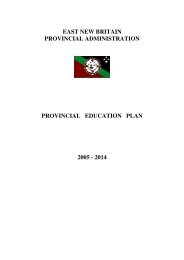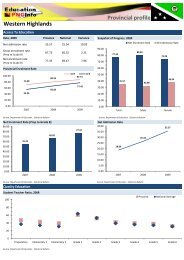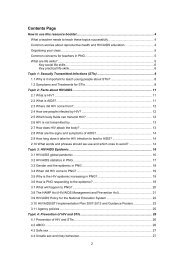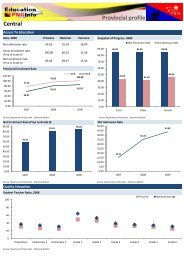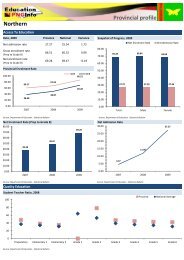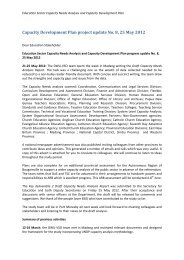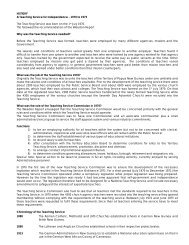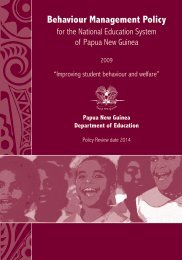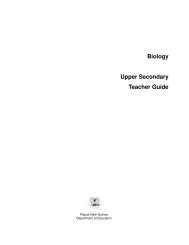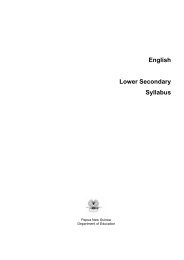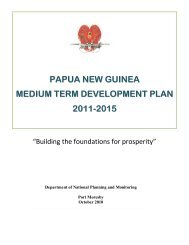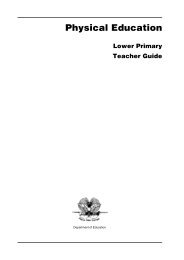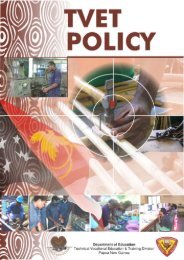1.1.4. Curriculum review <strong>and</strong> revision: Curriculum <strong>and</strong> teaching <strong>and</strong> learning documents addressing <strong>HIV</strong>shall be reviewed at least every five years to ensure that they remain up-to-date with new scientificfindings, new information <strong>and</strong> evidence from PNG, <strong>and</strong> best practice.1.1.5. Examinable subject: <strong>HIV</strong>-related content must be included in assessments <strong>and</strong> examinations at alllevels.1.1.6. Capacity building: All teachers <strong>and</strong> lecturers responsible for providing education on sexual <strong>and</strong>reproductive health issues, including STIs <strong>and</strong> <strong>HIV</strong>, shall be well trained to provide gender- <strong>and</strong>rights-based sexual <strong>and</strong> reproductive health education, using student-centred, interactive methodsthat promote discussion, personal reflection <strong>and</strong> critical thinking. All student teachers at teachers’colleges shall be fully trained to teach sexual <strong>and</strong> reproductive health, including <strong>HIV</strong>. Universitieswith Faculties or <strong>Department</strong>s <strong>of</strong> <strong>Education</strong> shall train teachers to teach personal development,including sexual <strong>and</strong> reproductive health.1.1.7. Encourage guidance by parents: Parents <strong>and</strong> guardians must be encouraged <strong>and</strong> assisted byeducational institutions to provide their children with guidance on sexuality <strong>and</strong> to teach their ownfamily <strong>and</strong> religious values <strong>and</strong> morals.1.2 Access to Protection1.2.1. Access to condoms: All learning institutions shall ensure that male <strong>and</strong> female condoms are easilyaccessible to students through partnerships with the Provincial <strong>AIDS</strong> Committee <strong>and</strong>/or a localhealth centre. All secondary schools, TVET institutions <strong>and</strong> colleges shall make male <strong>and</strong> femalecondoms easily available to students on campus. 81.2.2. Prevention <strong>of</strong> violence: School boards, staff, students <strong>and</strong> the school community at all learninginstitutions shall actively work together to prevent all forms <strong>of</strong> violence through education,awareness, <strong>and</strong> the implementation <strong>of</strong> policies <strong>and</strong> rules.1.2.3. Protection from sexual abuse <strong>and</strong> rape: Schools <strong>and</strong> institutions with student boarders shall makeadditional provisions for the protection <strong>of</strong> female <strong>and</strong> male students from sexual abuse <strong>and</strong> rape.This includes, but is not limited to, protection from rape for students going to the river to bathe <strong>and</strong>protection from sexual abuse, including rape, by other students, teachers or staff in dormitories.1.2.4. Non-tolerance <strong>of</strong> violence: Learning institutions must not tolerate any form <strong>of</strong> violence, includingbut not limited to, sexual harassment, abuse or exploitation; discrimination; <strong>and</strong> bullying. Anyperson who has committed any <strong>of</strong> the above must be subject to disciplinary procedures inaccordance with the Behaviour Management Policy for students <strong>and</strong> Teaching Service Act forteachers. 91.2.5. Links to child protection <strong>of</strong>ficer: All schools shall establish a relationship with the nearest childprotection or welfare <strong>of</strong>ficer or volunteer <strong>and</strong> refer students for welfare or legal support as requiredby the Lukautim Pikinini Act.1.3 Healthy <strong>and</strong> Safe Learning Institutions1.3.1. Health promotion: All schools shall include health promotion <strong>and</strong> <strong>HIV</strong>-related activities in theirSchool Learning Improvement Plans (SLIPs).1.3.2. Universal infection control precautions: All learning institutions shall minimise the risk <strong>of</strong> <strong>HIV</strong>transmission by adopting universal infection control precautions in all blood-related incidents <strong>and</strong>accidents. Infection control measures must be universally applied <strong>and</strong> carried out regardless <strong>of</strong> theknown or unknown <strong>HIV</strong> status <strong>of</strong> the individuals concerned. All persons should be considered aspotentially infected <strong>and</strong> their blood <strong>and</strong> body fluids treated as such.13 <strong>HIV</strong> <strong>and</strong> <strong>AIDS</strong> Policy <strong>HIV</strong> for <strong>and</strong> the <strong>AIDS</strong> National Policy <strong>Education</strong> for the National System <strong>Education</strong> 2012-2016System <strong>of</strong> Papua New Guinea13
1.3.3. Prevention after possible exposure to <strong>HIV</strong>: All learning institutions shall ensure access to postexposureprophylaxis (PEP, medication taken after possible exposure to <strong>HIV</strong>) by forming apartnership with a health centre that can provide it.1.3.4. Maintenance <strong>of</strong> first aid kits: All learning institutions shall purchase <strong>and</strong> maintain at least two firstaid kits, which include latex or rubber gloves, <strong>and</strong> disinfectant. First aid kits <strong>and</strong> cleaningequipment must be accessible at all times.Section 2: Care <strong>and</strong> Support for StudentsObjectiveAll schools <strong>and</strong> institutions shall be positive, supportive, <strong>and</strong> healthy learning environments where allstudents, including those living with <strong>and</strong> affected by <strong>HIV</strong>, can continue to learn <strong>and</strong> can access counselling,care <strong>and</strong> support, including support for access to treatment.2.1 Access to <strong>Education</strong>2.1.1. Universal access to education: Every person <strong>of</strong> school age, including all vulnerable children <strong>and</strong>children with special needs as defined by the Lukautim Pikinini Act must have access toeducation. 10 Access to education must not be affected by the person’s actual or presumed <strong>HIV</strong>status or the status <strong>of</strong> their family members.2.1.2. Support for continuation <strong>of</strong> education: Students living with <strong>and</strong> affected by <strong>HIV</strong> shall beencouraged <strong>and</strong> supported to continue their education as long as possible. Where necessary thisshall include special arrangements to cover the costs <strong>of</strong> schooling (e.g. arranging school fee supportfrom the <strong>Department</strong> <strong>of</strong> <strong>Education</strong>, waving school fees, organizing community support or assistingparents <strong>and</strong> students to access support from non-governmental organizations (NGOs)); flexiblelearning arrangements for students unable to attend on a regular basis; <strong>and</strong> transfers to new schools.2.2 Supportive Environment2.2.1. Positive school <strong>and</strong> learning environment: All schools <strong>and</strong> learning institutions shall provide apositive environment for students affected by <strong>and</strong> living with <strong>HIV</strong> – one that is free from stigma<strong>and</strong> discrimination based on actual or presumed <strong>HIV</strong> status.2.2.2. Protection from discrimination: All students must be protected from all forms <strong>of</strong> discrimination,including discrimination based on gender <strong>and</strong>/or on their actual or presumed <strong>HIV</strong> status or that <strong>of</strong>their family members. Students living with or affected by <strong>HIV</strong> must not be treated differently fromother students in a way that disadvantages or harms them in schooling, school-based activities oraccommodation.2.2.3. Protection from stigmatisation: Students who are living with or affected by <strong>HIV</strong> must not bestigmatised. In other words, people must not do or say anything to cause or encourage people tohate, ridicule, become violent towards or stay away from a student living with, thought to be livingwith or affected by <strong>HIV</strong>. People must not blame or talk badly about students living with oraffected by <strong>HIV</strong>.2.2.4. Access to counselling: All students shall have access to a trained counsellor who can provide themwith guidance on behaviour, including those that could put them at risk for <strong>HIV</strong>, <strong>and</strong> assist them todeal with <strong>and</strong> solve problems, including dealing with all forms <strong>of</strong> discrimination, stigma <strong>and</strong>traumatic experiences.14<strong>HIV</strong> <strong>and</strong> <strong>AIDS</strong> Policy for the National <strong>Education</strong> System <strong>of</strong> Papua New Guinea 14<strong>HIV</strong> <strong>and</strong> <strong>AIDS</strong> Policy for the National <strong>Education</strong> System 2012-2016



